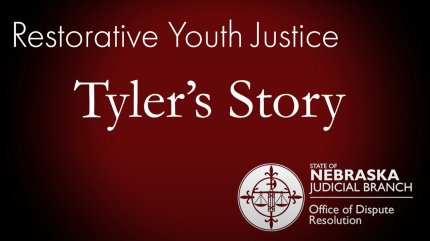Video Debut During Juvenile Restorative Justice Presentation at the Children’s Summit
Kelly Riley, Director of the Office of Dispute Resolution (ODR), and Dr. Anne Hobbs, Director of the University of Nebraska Omaha’s Juvenile Justice (JJI), collaborated to present on the Juvenile Restorative Justice and Family Intervention Initiative. Using Mentimeter, the presenters learned about attendees’ perceptions around juvenile restorative justice. Additionally, the presentation addressed the differences between restorative practice which is more about an overall systemic approach that is both proactive and responsive, and restorative justice that is in a response to an incident or offense, or in restorative terms, a harm, and a subset of restorative practices. The presentation also shared research, including results from ODR’s statewide Victim Youth Conferencing Initiative and JJI’s research on the use of surrogates in restorative justice conferencing.
The presentation highlighted the priorities and goals of the Juvenile Restorative Justice and Family Intervention Initiative, made possible through a Department of Justice Office of Juvenile Justice and Delinquency Prevention grant. The overall priority is to integrate additional restorative justice youth conferencing processes in all six mediation center regions across Nebraska to improve outcomes and reduce youth involvement in the justice system. The three key priorities are:
- Accessibility: Youth, their families, and victims all have access to services, at no cost, through an ODR-approved regional mediation center. Each center provides services throughout their service area.
- Fairness: The parties, regardless of financial or other disadvantages, determine what the outcome should be and if it is fair and just from their perspective.
- Increased Efficiency: Focus on ‘upstream’ referrals (pre-court, pre-diversion, diversion) allowing for a quick and efficient process without waste or duplication.
The goals of the initiative are to decrease the disproportionate contact with the justice system of Black, Indigenous, and other youth of color; reduce recidivism; and address family deficiency needs through family engagement.
The culmination of the presentation was the debut of a video of a young man, Tyler, who as a high school junior was involved in the justice system due to a serious offense. As part of his probation, Tyler participated in a Victim Youth Conference. In the video, Tyler talks about the offense, his terms of probation, participating in a restorative justice process, and the impact it had on him, including now serving as a surrogate when youth with similar offenses are going through a restorative justice process and the victim is not able or willing to be a part of the conference. Click here to view the video.

